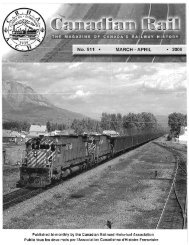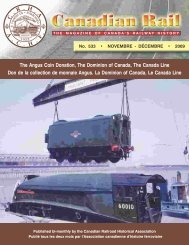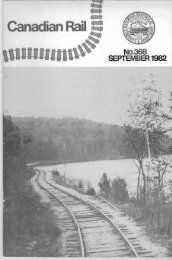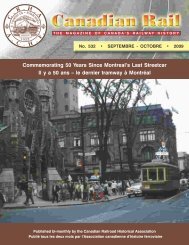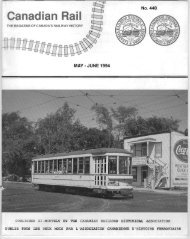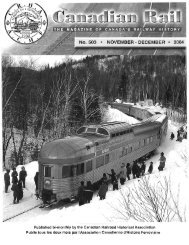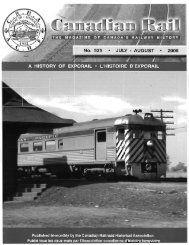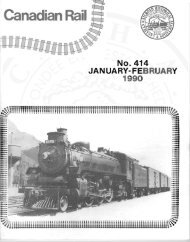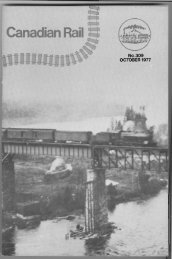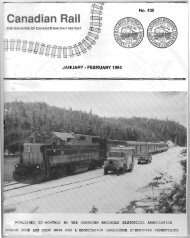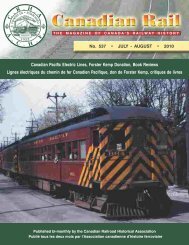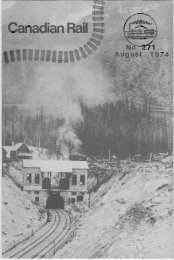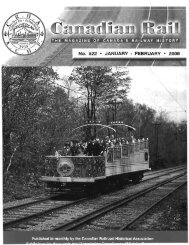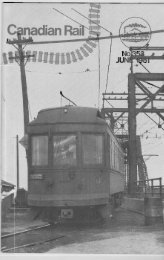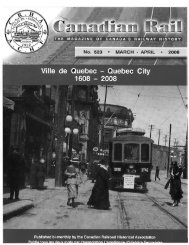Canadian Rail_no539_2010 - Le musée ferroviaire canadien
Canadian Rail_no539_2010 - Le musée ferroviaire canadien
Canadian Rail_no539_2010 - Le musée ferroviaire canadien
Create successful ePaper yourself
Turn your PDF publications into a flip-book with our unique Google optimized e-Paper software.
NOVEMBER – DECEMBER <strong>2010</strong><br />
275 CANADIAN RAIL • 539<br />
power for all the tea in China. Every trip seemed to be full<br />
of excitement; at least for me that seemed to be the case.<br />
There couldn’t possibly have been a more exciting<br />
occupation on a day-to-day basis.<br />
In August of 1960, I could no longer stand the<br />
frequency and duration with which I was being laid-off my<br />
job as a trainman. The company was purchasing more and<br />
more diesels every year and, although my seniority was<br />
getting greater, it was not growing nearly fast enough to<br />
compensate for the change of an era from steam to diesel.<br />
It was very disheartening to be continually laidoff.<br />
And it was very hard to find temporary work if your<br />
prospective employer suspected that you were a<br />
railroader and would go back when called. What was most<br />
frustrating of all was being laid-off for several months just<br />
prior to the festive season and, when called back for a<br />
couple of quick trips during the Christmas and New Year<br />
period, told that if you didn’t respond you would lose your<br />
seniority. This was followed by another lay off for another<br />
four months starting about January 2nd.<br />
What used to infuriate me, was the ‘mile hogs’ we<br />
had amongst the conductors and trainmen. Although our<br />
pay scale was somewhat less than that paid to enginemen<br />
and firemen and, consequently, we would have to work<br />
extra miles to make the same money, there were those<br />
amongst the conductors and trainmen who literally lived<br />
from one pay period to the next on the road. They could<br />
care less whether the spare board brakeman was able to<br />
make a living or not. It was these same mile hogs who<br />
abandoned their jobs in the festive season and felt it the<br />
responsibility of the spare board men to cover for them.<br />
The engine crew, on the other hand, were automatically<br />
pulled out of service each month when they reached 3800<br />
miles, which gave the younger men a chance to earn a<br />
living. It took a Royal Commission, long after I had quit,<br />
in order to bring any semblance of proper working<br />
conditions to the job.<br />
But, having said that, railroading was a thrilling<br />
way to earn a living and I’m not sorry for one minute that I<br />
gave it a try. I look back with fond memories to those trips<br />
when I was up on a steam locomotive in the middle of the<br />
night, going ‘hell bent for leather’ to keep ahead of a<br />
passenger train and make several ‘meets’ as well. I wish I<br />
could have stayed with it till I received a pension, but that<br />
was not to be.<br />
I’m glad I took my camera along with me on some<br />
trips. I only wish I had taken it along much more often. I<br />
was able to use the old photographs to bring back<br />
memories that had long since vanished, some of the<br />
photos having been taken over fifty years ago. Anyway,<br />
I’m glad we got the photos because some of the fellows<br />
have long since passed on and without the photos they<br />
would be hard to remember.<br />
Well, ‘let’s get this train out of town,’ and get the<br />
car knocker to ‘High Ball the Gate.’<br />
The above are edited extracts from The Last days of<br />
Steam, the memoirs of Trainman Allan B. Peden taken from<br />
a 75 page souvenir book Allan wrote and sold to his CNR coworkers<br />
after he left the company. His CNR career spanned<br />
from July 18, 1951 to August 1960. To read his complete<br />
memoire search the internet for ‘the last days of steam’. Our<br />
abbreviated version featuring some of his steam locomotive<br />
experiences are presented with the permission of Al Peden of<br />
Winnipeg, Manitoba.<br />
How deadheading ended a career<br />
By Dave Brown<br />
At first, there didn't seem to be anything unusual<br />
about the small train heading north towards the Prince of<br />
Wales Bridge at 10:35 a.m. Sunday. I was riding my bike<br />
along the Ottawa River Parkway and daydreaming when<br />
the feeling that something was out of place hit me. It took<br />
a while to sink in. First the sound – steam. Then the sight.<br />
That train didn't belong there. It was engine<br />
1057, gurgling along contentedly and pulling a short string<br />
of old passenger cars, off on its first excursion of the<br />
summer to Wakefield. Being from a railroad family (both<br />
grandfathers and my father were CPR trainmen), I have<br />
in the past watched so many similar trains and engines<br />
from a bicycle that time has lost its meaning. That's why it<br />
had been difficult focus in on what was wrong with the<br />
scene around me.<br />
I stopped on the overpass and in the sounds and<br />
smells of steam, easily slipped back 25 years and<br />
remembered how my railroading career was cut short at<br />
age 12.<br />
Start of a lesson<br />
I had informed my father that I wasn't too<br />
interested in long-range education planning because I<br />
was going to be an engine driver just like him. He tried to<br />
talk me out of it, but nothing seemed more fun. So he<br />
taught me out of it.<br />
A few days later, he asked me if I wanted to be his<br />
fireman on a deadhead run to Markstay, near Sudbury. It<br />
was a warm summer night and darkness had fallen when<br />
we approached the roundhouse to pick up our engine.<br />
We walked past many big and modern engines of the day.<br />
There were coal-burners and they all seemed as<br />
streamlined then as a rocket ship today.<br />
In the locker-room in the roundhouse, I was<br />
introduced to the fireman, who thought it a good idea that<br />
he would be getting the night off. Then the suspense<br />
ended as we went out to meet our engine.<br />
Biggest let-down<br />
It was a small and tired old hand-bomber. It<br />
looked much like 1057. It was embarrassing. We chugged<br />
out backwards beside those gleaming modern engines.



